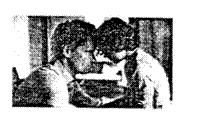题目内容
American people like to “Thank you” when others help them or say to them. Many Chinese people do so, . It is a very . You must say “Thank you” when someone passes you something on the table, when someone the door open for you, when someone says you do your work , or you buy a nice thing or your city is
“Excuse me” is another sentence(句子)they often say. When you hear someone say “Excuse me” you, you know he wants to pass you without touching(接触)you. If you want others, say “Excuse me” first, and then begin talking.
Let’s “Thank you: and “Excuse me” from now.
“Excuse me” is another sentence(句子)they often say. When you hear someone say “Excuse me” you, you know he wants to pass you without touching(接触)you. If you want others, say “Excuse me” first, and then begin talking.
Let’s “Thank you: and “Excuse me” from now.
| 小题1: |
|
| 小题2: |
|
| 小题3: |
|
| 小题4: |
|
| 小题5: |
|
| 小题6: |
|
| 小题7: |
|
| 小题8: |
|
| 小题9: |
|
| 小题10: |
|
小题1:B
小题2:A
小题3:D
小题4:B
小题5:C
小题6:C
小题7:A
小题8:D
小题9:B
小题10:A
试题分析:美国人喜欢说“谢谢你”当别人帮助他们或夸奖他们时。很多中国人也这样做。 如果你想插话,一定要先说"对不起" ,然后再说话。让我们从现在开始说礼貌用语:谢谢你、对不起。
小题1:考查动词辨析及语境的理解。美国人喜欢说“谢谢你”,当别人帮助他们时……。A.说话或某种语言; B.说后跟说的内容; C.告诉 D.谈论。这里应该是说的内容是Thank you,故选B。
小题2:考查合成词辨析及语境的理解。美国人喜欢说“谢谢你”,当别人帮助他们或者说了夸奖他们的话时。习惯上something /(用于肯定句)anything(常用于否定句)的定语后置。这里是肯定句,所以选A。
小题3:考查副词辨析及语境的理解。很多中国人也这样做。A。 也,用于肯定句句中; B.所以/这样; C.也,用于否定句中; D.也,用于肯定句句末。故选D。
小题4:考查形容词、名词辨析及语境的理解。这是非常好的习惯。A.健康的习惯; B.好习惯; C.好的生活方式; D. 健康的生活方式。结合句意可知选B。
小题5:考查谓语动词辨析及语境的理解。当有人为您开着门的时候。这里keep做谓语动词,且整个文章的时态是一般现在时,而且主语是第三人称单数,所以用keeps,选 C。
小题6:考查合成词辨析及语境的理解。当有人说你做的工作好时。A.几乎不 ;B.形容词,好的;C.副词,好; D.形容词,好的,这里用副词修饰动词。所以选C。
小题7:考查形容词辨析及语境的理解。您的城市很美。A.漂亮的; B. (脏的); C.拥挤的;D.枯燥的。所以选A。
小题8:考查介词辨析及语境的理解。当你听到别人对你说"对不起"时,下文说:他想从你身边过去又不碰到你。由此可知选D(在后面)。应该是next to(紧挨着);across(平面穿过);in front of(在……的前面)。
小题9:考查动词辨析及语境的理解。这里应该是:如果你想打断别人的话,want to do意为想做某事。故选B 。
小题10:考查动词辨析及语境的理解。让我们从现在开始说“谢谢你”、“请原谅”。 Let’s后用动词原形形式,所以选A。

练习册系列答案
相关题目


